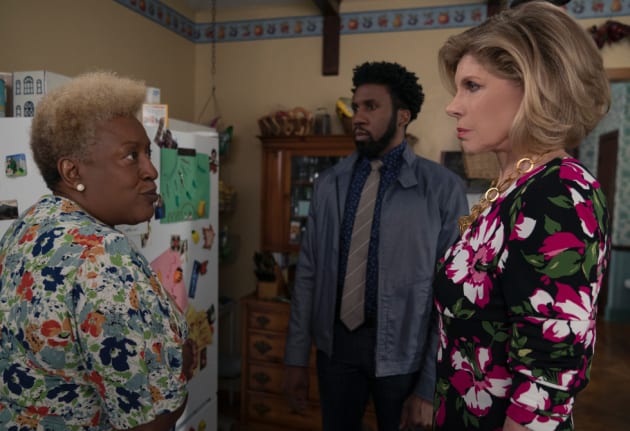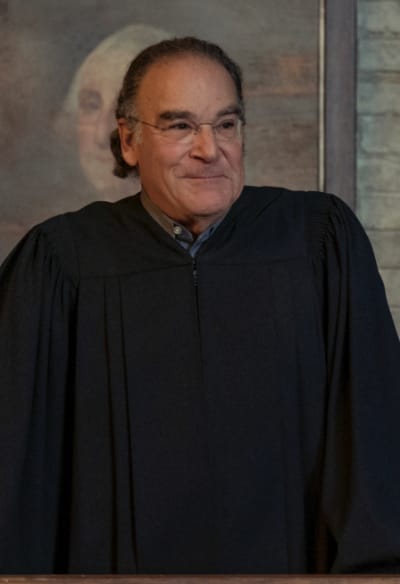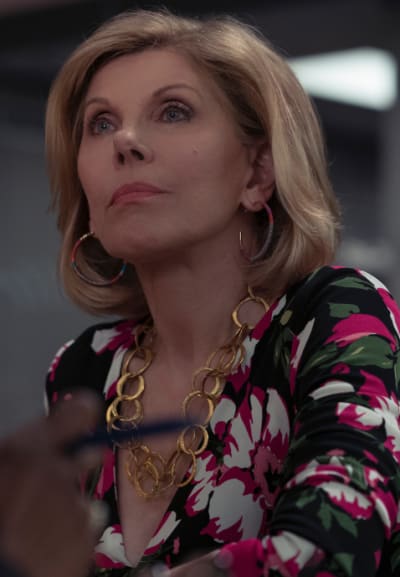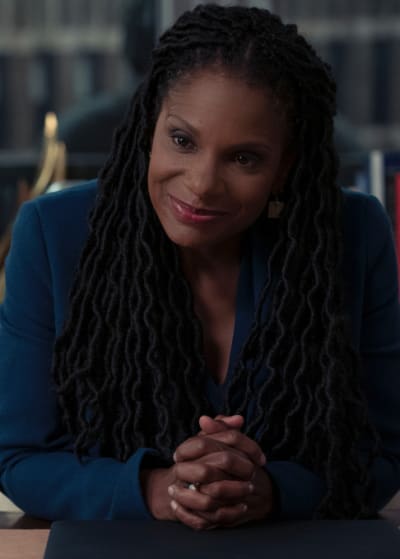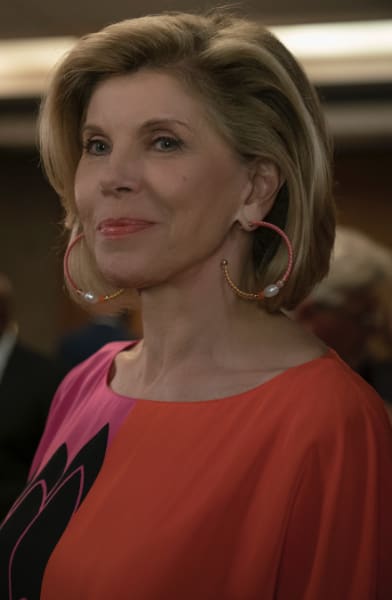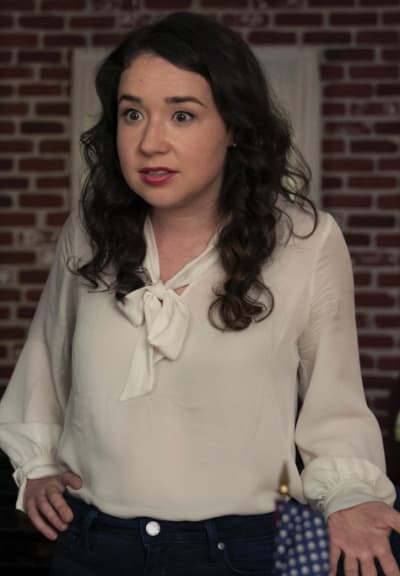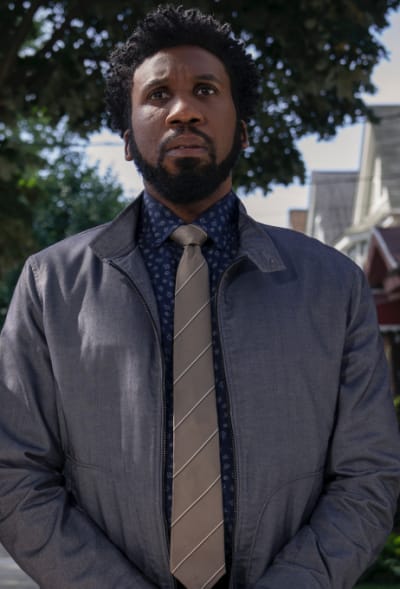We have officially jumped the shark.
If you were on the fence before (like me), the post-credits of The Good Fight Season 5 Episode 10 made it abundantly clear this series has gone off the deep end.
What started as a season full of possibility and exploration has turned into something unrecognizable and no longer set in reality. The show has reached the point of no return and is heading straight toward crazy town.
That’s not to say we should write off The Good Fight entirely. The way The Good Fight Season 5 ended allows the show to course-correct come Season 6, as most of the storylines were wrapped up rather nicely.
Should the writers decide to disregard the events of its mediocre fifth season and blame it on a gas leak à la Community, that’s something that could be arranged.
Diane: Ma’am, is it true that you are thinking of trying Matteo for murder.
Vinetta: Yes. May I show you something?
Diane: Of course.
Vinetta: This is Christopher. He was walking home from school when he got caught in the crossfire of gang shootout. One of the gangs was Oscar Rivi’s. I did the eulogy Christopher’s funeral. Ever done a eulogy for an 8-year-old?
Diane: No.
Vinetta: Not pleasant. This is Gabriel. He wanted to go to USC film school. He was killed by a corner boy who mistook him for somebody else.
Diane: I am sorry. I mean I can’t say that I understand your pain, because, of course, I can’t, but Matteo should be given over to the police, not held here.
Vinetta: The police haven’t arrested anyone for those murders, any of these. Since the BLM Movement, they’ve pulled back from our streets. No one’s coming to help. That’s why I started this court. It’s not a joke to us. It’s not your firm’s reality show…
Diane: Oh, that’s not my firm.
Vinetta: Actually it is Mrs. Lockhart. If I were you I would prepare your client for trial.
Because again, before the last few minutes, the season finale was a pretty solid, if not way over the top, season-ender.
There were, of course, some issues, namely the Chicago Police Department busting up Vinetta’s community court because of intellectual property theft rather than false imprisonment and unlawful restraint, but it’s nothing we haven’t dealt with all season.
So as frustrating as it is not to see these fictional characters objecting to the illegality of Wackner’s and Vinetta’s courts and the faux judges doling out punishment (illegally imprisoning people, keeping them in cages), it’s become almost commonplace. No one except Marissa even bats an eye at all this craziness.
As I’ve pointed out many times, it’s ludicrous that our favorite characters haven’t involved the authorities, gone to the press, or filed a lawsuit.
They may not be happy with what’s going on before their very eyes, but nearly all of them — Marissa, once again, being the exception — do nothing to stop it.
Yes, they’ve got a billion other things going on right now, and the firm has reached its tipping point, but how hard is it to file a police report or a lawsuit. Diane, Liz, and co. are lawyers, after all, and on a show called The Good Fight, you’d assume the characters were, well, fighting the good fight.
It’s been a clusterf*ck of a situation, but it’s one we’ve unfortunately become used to. So if we disregard the presumed insanity and ignore the lack of action, we found ourselves with a satisfying 50 minutes of television, excluding the final few minutes, of course.
One of the biggest developments of the installment was Diane relinquishing her name partnership at the firm.
Diane: I want you and Allegra to be name partners. I’ll be an equity partner.
Liz: Why?
Diane: Five years ago when I hit rock bottom, this firm took me in. I don’t like the idea of splitting this firm in two, and I can’t lead if no one will follow.
Liz: And your clients?
Diane: We’ll manage them together.
Liz: You’re essential here Diane.
Diane: I know, but I think I need to prove myself.
Liz: I missed you.
Diane: I’m here.
Weirdly, her false imprisonment made Diane understand what Liz and the other Black equity partners have been trying to tell her all season: As a white woman, she shouldn’t be leading a Black law firm in this day and age.
It took Diane a while to get there, but in the end, she did. Diane’s heart is usually in the right place, so we knew she would get there eventually, but she got caught up in what she felt she was owed rather than what she owes to others.
She felt she deserved her name partnership because of her hard work, client roster, and billable hours, but it’s not just about her clout, stature, and countless years of experience. It’s also about Diane, as a person, and as she mentioned to Liz at the start of the season, she can’t change her skin color.
No one can deny that Diane is an asset to this firm, but as a white woman, she shouldn’t be the head of a Black law firm. So much of this season saw Diane and Liz at odds over the former’s name partnership, so it’s quite a relief that they were able to patch things up by the end of the episode.
Diane and Liz are at their best when they’re working together, fighting the good fight, instead of being at odds, and Diane stepping aside has allowed the pair to resume their friendship/lesbian lover status.
Additionally, while in jail a cage, Diane realized she likes starting over, which, upon reflection, is so true. It had never crossed my mind before, but Diane does like that challenge of fighting her way to the top.
Throughout the series and its predecessor, Diane started over several times, most notably when she left Lockhart Gardner to join Florrick, Agos, and Associates at the end of The Good Wife Season 5 Episode 22 and then again when she “retired” on The Good Fight Season 1 Episode 1.
This revelation means the title of the Paramount+ series takes on a new meaning: The characters on this show don’t just fight the good fight, but they also like a good fight, which is especially true for Diane.
Diane: I should quit.
Kurt: What are you talking about?
Diane: That judge upstairs, she looked at me like I was the most entitled white bitch on the planet, and that’s the way they look at me at work.
Kurt: No, no, no.
Diane: Yes, they do. I’m the top Karen. And why do I care? I could find another firm. I could quit. I can’t impose my will on people who don’t want me, and they don’t want me.
Kurt: Diane, I’m going to stand on this cot because I want to be demonstrative.
Diane: I should videotape this.
Kurt: No, no, we’re gonna forget this tomorrow. My worry is that you will make a decision you’re gonna regret.
Diane: I think Kurt, Almighty Kurt, I think I like starting over. I like the chutes and ladders of life. I want the corner office, but then I want to slip back to the beginning and fight for the corner office. I think maybe it’s better that I don’t get the top spot.
Kurt: OK, as long as you’re happy, and we keep fucking.
She likes clawing her way to the top, but once she’s there, she misses that, so her stepping down as a name partner provides her with the opportunity to keep on fighting to regain her top position.
There may very well come a time when it’s more politically correct for a Black law firm to have a white name partner, and if that time comes, you can bet, Diane is waiting in the wings.
Elsewhere, Wackner’s court ended the way it started: with a bang. Yes, the facsimile court got destroyed by white supremacists — yes, you read that right — after Wackner decided to block a portion of Illinois from seceding from the state. (As an FYI, it’s illegal to secede from the United States).
The cases Wacker adjudicates have become exponentially crazier as each episode passes, so it wasn’t that much of a shock that the false judge found himself overseeing a secession case.
Interestingly, though, the show’s exploration of who has authority to make decisions in this country. The irony isn’t lost on me that I hated the result of this thought experiment, but as a premise, it’s still fascinating.
The show’s problem was it took this idea to the extreme by ending the episode with people holding their own kangaroo courts and essentially doing what the f*ck they wanted.
However, this attempt would have been more successful if the series had just focused on Wackner’s court as a case study. Then, it could have been a powerful example of how absolute power corrupts absolutely and how things only have meaning if we decide they do.
Instead, the show got bogged down in trying to push the envelope when the quieter ending of Wackner closing his court after realizing it didn’t hold the meaning he thought would have been better.
Marissa: Then why care when Judge Wackner decides.
David Cord: Why?
Marissa: Yes, why should you defer to him? Why defer to anyone?
David Cord: Isn’t that the point of this entire experiment? Judge Wackner judges because we, the people, do not like the Cook County judicial system.
Marissa: So if you don’t like this court system, you’ll just start a new one?
David Cord: I guess.
Marissa: So then why does this matter, this court?
David Cord: It matters only in so far as we continue to agree that it matters.
Marissa: So if you don’t like Judge Wackner’s rulings, you can just ignore them and create a new court?
David Cord: Yes, however, I’m guessing that I will like the way the judge decides.
Marissa: Your Honor, is this what you think? That it doesn’t matter what you decide?
Wackner: I need a moment to consider my ruling.
It would have capped his storyline off nicely about a man who sets out to make the world a better place only to discover the pitfalls that come with such an idealistic goal.
So, the series chose to take the perversion and bastardization of Wackner’s court and have it spread to the rest of the world in its jump-the-shark post-credits.
Some stray thoughts:
-
With Wackner closing his court, does this mean Mandy Patinkin won’t be back as a series regular next season?
As much as this storyline frustrated me to no end, Wackner was still a breath of fresh air, and Patinkin was a joy to watch. If this is the end, I’ll miss the character deeply.
-
After the shit show that was STR Laurie’s visit, how worried should we be about the firm’s future?
The firm’s Dubai overlords already believed there was discord at Reddick Lockhart. With Diane and Liz MIA during their visit, STR Laurie can’t be happy with how management is handled.
-
Why was so much time spent on Oscar Rivi this season? He’s not a very likable character, and he didn’t bring much to the series, yet the last two episodes spent a good portion of time devoted to his business dealings.
Was it so that Carmen would have something to do?
-
Diane and Kurt are so cute. They started the season in a precarious position, but they’ve come through the other side stronger than ever. They truly are a couple that can overcome anything.
-
How worried should we be that Jay’s still hallucinating historical figures?
So what did you think, Good Fight Fanatics?
Will you watch the show for its sixth season?
Did Diane make the right choice in stepping down?
What’s your take on the post-credits?
Hit the comments below to let me know your thoughts.
Jessica Lerner is a staff writer for TV Fanatic. Follow her on Twitter.
